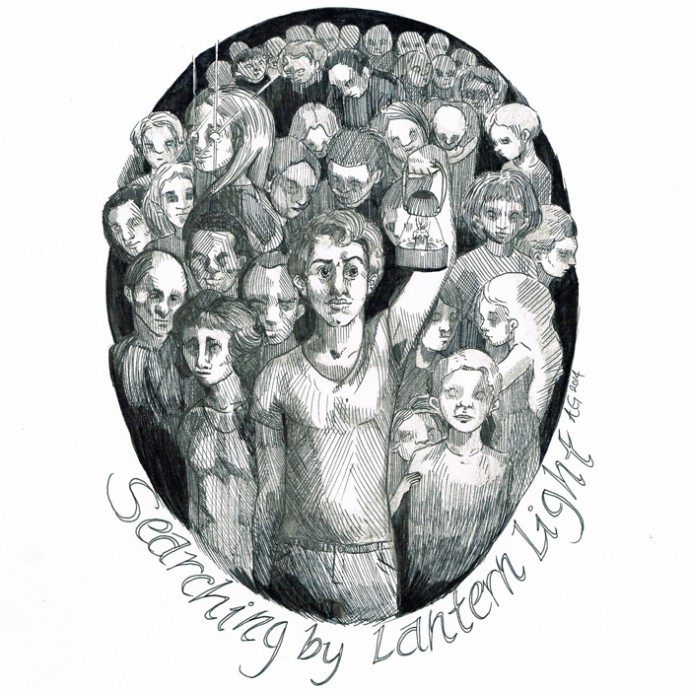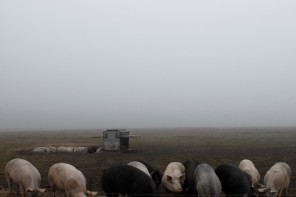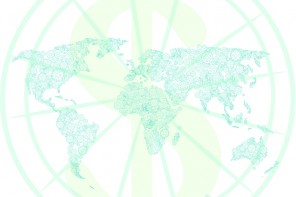Diogenes was a crackpot philosopher who never got much respect while he was alive. It’s said that he lived in a barrel and would walk the streets by day holding a lantern. Most passersby didn’t give him much thought, but every so often someone would ask what he was doing with a lamp in broad daylight. Diogenes would smile and say, “Searching for a genuine human being.” Here a Philosophy doctorate student tells the story of how and why he left his community of academics to follow in Diogenes’ ancient footsteps…
I was three years into my doctorate in Ancient Philosophy at one of the best places in the world for what I do. I was comfortable, had a good stipend and was on a career path toward a life of prestige, going to conferences and art shows, sipping cocktails with elegant sophisticated people and lamenting how this or that once avant-garde artist has become mainstream.
But it didn’t feel right.
I once made the mistake of saying within listening distance of the Chair of the Philosophy Department that I was thinking about taking some time off and doing a little bit of soul-searching.
“Soul-searching?!?” He nearly swallowed his tongue. Like, “How dare you utter the most vile of all possible phrases in my presence!”
But if not the soul, then what does the modern philosopher seek to know? One time I asked a philosopher what he does. “Being a philosopher,” I asked, “what do you know?”
“I know how to tell good arguments from bad arguments,” he said. That’s basically what it’s come to. The science of arguments. And yet philosophy means love of wisdom. Wisdom is more than what can be articulated and disputed. Philosophers today are really good at winning arguments, and this capacity imbues some of them with the idea that they possess a sort of magical skill; they can reason through and understand everything. Sure, most of them work on interesting questions, but it’s impersonal and—to me—not what the pursuit of wisdom is all about.
So I thought back to the times when I really felt as if I’d moved closer to wisdom. The story of Diogenes resurfaced from the library of my subconscious and provided the answer. Being with and observing extraordinary people, people whose lifestyles or ways of thinking are so unique that they force you to re-examine your own life and basic assumptions, has always taught me so much more than lectures or course work.
So I set out to wander the world in search of such people.
I bought a backpack and watched some YouTube videos about hitchhiking and how to travel on the cheap. I told my sister what I’d be up to and that I would send her license plate photos whenever anyone picked me up. I told no one else. I packed a phone, a laptop, a camera to film the people I met, and antibiotics in case I got yellow fever in South America. On the way out the door I noticed my violin and thought, “Ah, what the hell,” and took it along. Good thing I did. It ended up providing me with food and many a good time. That’s all I had. That and some names on a map.
Coming up with those names wasn’t easy. The whole idea was to seek teachers. No great thinker ever lived in isolation. Aristotle was taught by Plato, whose teacher was Socrates and so on. Basically I had to think really hard about whom I wanted to learn from.
There was a steep learning curve when it came to approaching and connecting with the people on the list. If I had an address, ideally I’d just show up and try to speak to them. If I found a phone number or email, I’d call or write them. Sometimes I could only communicate with a secretary or assistant, which was more difficult, especially if the person was famous and had protective or possessive assistants.
For others I would send an email maybe a week beforehand and say, “I’m gonna be there in a few days. I’m on this mission. Blah blah blah.” At first I made the mistake of not doing good PR. I thought I could meet the people I wanted through enthusiasm alone. Anyone who wouldn’t speak to me without personal incentive, I figured, wasn’t the kind of person I wanted to learn from. What a snobby way of thinking that was. Everyone is busy and everyone needs incentive. I never lied, but I did craft my words carefully. I’d say, “I’m writing down these experiences—I’d like to write about extraordinary people.” and I hinted that it would generate a little publicity.
The longest I stayed anywhere was a month, in Santiago. I wanted to meet Miguel Littin, the filmmaker who secretly returned to Chile after being exiled and documented the situation under Pinochet, eventually playing a key role in toppling the dictatorship. I eventually tracked him down after a lecture he was giving. He liked my story, and I got to interview him. My violin sealed the deal. He asked to hear some, liked it and invited me to join him and his family for the weekend at his country home. He said his mother was old and sick and would probably love to hear some violin.
We roasted a lamb, toured the vineyards, and I entertained with my violin. I ate more fresh figs than I ever thought possible.
He told me that he’s always had so many ideas and not enough time to pursue all of them. I asked how he decided which projects to do and which to put aside. He gave a very simple answer. He always chose the project he was most passionate about. That was the only criterion. Not career, public opinion, or people’s expectations. Just whatever he was most passionate about.
That was a kind of a revelation. In today’s society many are made to think that they must follow a ‘career path’, and veering even slightly from it will permanently hurt their careers. But in the end, life is unpredictable, and all we are left with is the garden in our soul, which only flourishes if tended according to its own nature and allowed to grow at its own pace.
One of things I wanted to explore was happiness, and Littin was the happiest person I met. Contributing a large portfolio of beautiful art to the world already checks off a lot of things that people associate with a good life. But he also has this huge family. He’s a happy grandfather with tons of little grandchildren. On weekends his whole family gets together in the country. That’s—I think—his true source of joy. It’s one of the most obvious things a primitive culture would indicate as the formula for happiness, and yet a lot of people today see relationships and family as a hindrance to personal happiness.
I met a famous composer in Greece with a parallel story. He struggled against dictatorship with his art and pretty much accomplished as much as Miguel Littin did in Chile, but he doesn’t have that family. Just one daughter. I met him too and he’s old and I can sense that, despite all his admirers, he’s somehow lonely.
I noticed along the way that all of the people on my list were similar to me in different ways, like my subconscious was trying to find similar people so that I could see how they live, how they do it, what makes them happy and what doesn’t.
For example, this guy in Seattle, Jason Webley, disappears from the public almost every year. He used to enact his own death every Halloween. He would build a bonfire, burn all his clothes, his signature porkpie hat, shave all his hair and get into a coffin that was then put into a hearse and driven away, disappearing for six months. In the spring he would reappear, reborn.
His repeated rebirths and redeaths were deeply tied to his sense of self. He had to repeatedly die, leave the world and find out who he was. A life of searching for meaning is not always fun and pleasant. It’s partly a tormented life. This particular guy’s creativity was intimately tied to being tormented by questions. That’s my fate as well. It can sap your energy sometimes, cause inertia, but observing someone like that, someone able to harness his torment creatively, helped me accept that part of myself.
I suppose you can travel physically or you can travel with books. If you spend your whole life doing only one of those, you’re gonna get lost. The long-term travelers I met—those who’d been traveling for more than a few years—seemed lost. Like moving from place to place was all they could do anymore. I was gaining so much experience but wasn’t able to balance it with exploring books and exploring the mind. I got to a saturation point and realized that I wasn’t going to learn anything more unless I allowed my brain to process everything. Sort of my own birth–death/winter–spring cycle.
I want to get philosophy outside the Ivory Tower, maybe with YouTube documentary videos or writing stories that illustrate different issues from ancient philosophy… I value old wisdom. We live in a society that believes in progress and that we’re always making it. But often what we call progress is a thousand-year-old idea. Sometimes it’s a regression. Just look at all the past century’s short-lived revolutions. It hurts us to neglect ancient values. As Nietzsche said, we can use knowledge of the past to put pressure on the present for the sake of a better future.
Modern philosophy aims to construct a set of universal morals that ignore the constitutions of the individuals those morals would apply to. When you look at ancient Chinese or ancient Greek literature and philosophy, there’s a lot about how being a good person depends on one’s unique character and ability. Stuff that’s been all but forgotten. I’d like to help keep it alive. Academics aren’t doing that.
I hope my writing will catch people’s attention. Whether you go and find people or you enable them to find you is just a change of reference frames. Partly I write for myself, to relive my experiences, figure out what I learned from them and better understand what I’m doing. Hopefully it’s evolving into something that other people can use to connect to me, with a wish to collaborate—intellectually and creatively.







